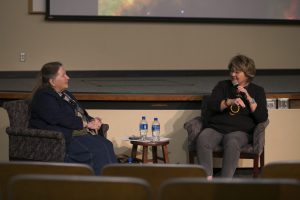Katie Walker
Arts & Features Staff
[email protected]
Cultures around the world each have their own perspectives on the sky.
In Navajo astronomy, stories and information have remained sacred and hard to come by. The information is passed down through generations of oral storytelling.
Nancy Maryboy, president and executive director at Indigenous Education Institute, currently works to provide a Native American voice in NASA projects, research development and public education in the U.S.
“Navajo has a rich and strong astronomy,” Maryboy said. “Each clan has their own stories and we respect all of them.”
Maryboy came to UNC Asheville to discuss her journey while uncovering the stories of Navajo astronomy.
“The way we learn is very interesting,” Maryboy said. “There is no book in the library we could trust, so we went to our families.”
When gathering information, Maryboy consulted multiple elders to gain permission to share their knowledge of indigenous astronomy.
Dylan Clark, adjunct assistant professor of sociology and anthropology, said he found Maryboy’s discussion to be interesting because it described knowledge sharing regarding astronomy as a variable across social axes, such as gender, within Navajo traditions.

Sabrina-Delphine Staton, a sophomore women, gender and sexuality studies student, said she attended the event as a part of her Indigenous Perspectives on the Sky class. She said the panel elaborated on a short film she saw earlier in the day.
The viewing took place inside of a portable geodome theatre, which allowed the film to be played on the ceiling.
“It was sort of like an IMAX theatre in that the screen wraps around most of the interior space, but much smaller and shaped like a solid-black igloo,” Staton said.
Clark said he has been following Maryboy’s research for many years and enjoyed getting the opportunity to meet and talk with her. In his own archaeological and anthropological research, Clark studies the Mayan culture of Mesoamerica.
Because of Maryboy’s research, Clark said he became inspired to think about what he sees around him and in the sky in new ways, as well as the connections between Maya, Navajo and Cherokee astronomy.
“I really enjoy having the opportunity to participate in and learn from conversations involving many different indigenous cultures, whether Navajo, Cherokee or Maya, and where they find common ground or have contrasting experiences and cosmologies,” Clark said.
During the discussion, Maryboy described her perspective on things such as how solar eclipses are viewed and the ashes of deceased people being sent to the moon.
When Eugene M. Shoemaker, planetary geologist, passed away, his ashes were sent in a capsule to the moon. This caused a lot of debate through different religions and cultures around the world.
“I’d heard the story about Shoemaker’s ashes before, but it had never occurred to me what that action would mean to people whose religion regards the moon as a sacred being,” Staton said. “Thinking about it now, I’m appalled.”
Maryboy said she did not think much of the latest solar eclipse and did not know the event was taking place until she noticed the shadows changing shapes.
When she was growing up, Maryboy got a chance to see an eclipse. She pushed a bucket of water under the chimney and watched the reflection so she could see an eclipse for herself.
Staton said she thinks a burial in space could be interesting, but she does not think a group of people should be able to claim the moon in such a way. Placing someone’s remains on the moon could be seen as disrespectful to cultures who view the moon as sacred.
“In culture everything makes sense, everything has a meaning,” Maryboy said.
Staton said she encourages other students to take advantage of guest speakers coming to campus. The events create a space where a student can learn more about a topic of interest and meet experts in the particular field.
Looking forward to attending more events in the future, Clark said he hopes to see more events similar to the Cherokee and Navajo Perspectives on the Sky come to campus. He said the more cultures and religions UNCA can bring to campus, the more connections can be discovered.
Clark said sharing information across disciplinary borders activates and stimulates new ways of thinking and approaching topics like astronomy, language, literature, religion, physics, mathematics, etc.
“If this encourages us, whether we are Native or non-Native, to reflect on our own understandings of the universe and our place within it, then we’ve accomplished something significant,” Clark said.



















